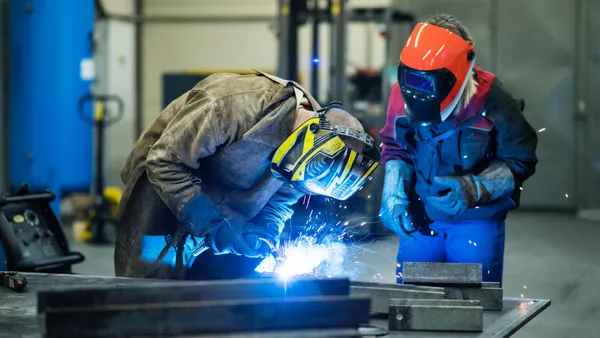Dive Brief:
- Despite artificial intelligence's (AI) impact on the workplace, only 47% of HR leaders in tech industries think technology will create more jobs than it will replace, and just 42% of tech company CEOs plan to upskill the majority of their employees in the next three years, according to a new KPMG report.
- The report found that across generations, tech leaders were more likely to believe that automation technologies will create more jobs than they eliminate, a view shared by 65% of millennials in tech surveyed and 88% of Gen X tech leaders surveyed.
- A key challenge for business leaders will be "successfully integrating human labor with AI," KPMG said in a news release. The company recommended that HR leaders and CEOs in tech: 1) reshape HR's value to their organization, use tools to enhance the transformational technologies like AI and data analytics; 2) train employees and refine their roles for the workforce; 3) appreciate employees as "customers" in a workplace that's "increasingly global, digital and agile"; and 4) become comfortable with new technologies.
Dive Insight:
The debate continues over the number of jobs AI will eliminate versus the number it will create. But what appears to be clear is that as jobs continue to be automated, higher-level skills will be required to handle AI-related tasks, and employers will need to hire or train people to prepare for the inevitable transition.
Although workers have the most to lose from automation, many seem less worried than business leaders about their jobs being eliminated, as the KPMG report showed. A recent Robert Half poll found that only 12% of workers feared AI would negatively impact their jobs. In fact, 40% believed that technology will have a positive effect on their jobs, and nearly half didn't think it will have any impact.
The good news for employers is that much of today's labor force appears ready to make the digital transformation through training or upskilling; 74% of workers in a 2018 Randstad Workmonitor survey said they view automation as a career opportunity. Experts say employers must be ready to respond to workers' desire for training with development as a priority. Speaking to HR Dive, Dennis Baltzley, senior partner and global head of leadership development solutions at Korn Ferry, said that organizations must "make learning and development a value and expectation", and that they be weaved into the fabric of the culture.
Automation, however isn't without concerns; least skilled workers and women in some occupations could be hit the hardest, according to employment experts.












